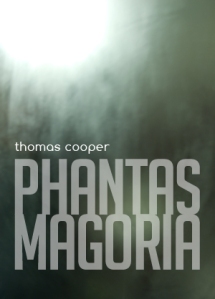 Phantasmagoria
Phantasmagoria
By Thomas Cooper
ISBN: 978-0-9821512-3-5
44 pages
$6.99
Reviewed by j. a. tyler
Robert Olen Butler says that Thomas Cooper’s Phantasmagoria “is, to put it simply, one of the three or four finest collections of flash fiction I’ve ever read.” And Michael Martone calls these “stunning stories.” So there you have it: two fantastic writers touting a work with the utmost respect and admiration, a feat not easily achievable by any standards. Or is it? But whether you believe in the blurb-game or not, the questions remain: are these remarks about the book true? Does it deserve the praise?
Yes, I believe so.
Phantasmagoria begins by bringing the reader into a closet, where a tiny woman lives. Her life mirrors the narrator’s own attempt at getting a grip on things. In “The Old-Fashioned Way,” we find two men at odds in a cemetery, both putting flowers on the same grave. Shopping catalogues arrive for a dead woman in “Bounty.” A husband and his son in “Holes” dig up dirt searching for his dead wife’s “time capsule.”
From “Bounty”:
The silky paper beneath his fingers, so like her skin when he slicked her shoulders with suntan lotion long ago, and that smell of vanilla and lavender and nutmeg when he tips his nose closer, so familiar he can’t help but think, My god, Charlotte, is that you?
It’s a meaty beginning, one ripe with twisted language. Picture the vine weeds that crawl fences, the ones that take over when no one is looking, and no matter how much they are pulled they grow back, longer and thicker, strangling all the things we want to see flourish. This is Thomas Cooper’s wonderful flash collection from Keyhole Press.
From “Tricks”:
I want to slap some sense into this fifty-year-old woman, tell her this is no time for her tricks, but I would never dare. Instead I pick a hand. Sis unfurls her fingers and shows me the antique fob watch. For a second it doesn’t even feel like everything has changed.
But it is not all death and life gambles either. Phantasmagoria is also full of clever and smarting stories built on the same subtle, evolving language. There is a who’s who in America, a tornado martini topped with an affair confession, an object a receptionist cannot rid herself of, and an “M” laden baby-spoon that attaches itself to no one. Wit and bravado brim over in these stories.
From “Sir Montague”:
His mother sleeps late into the morning and he can hear her snoring from the kitchen as he makes himself banana and chocolate syrup sandwiches. Occasionally his mother is in such a deep sleep that she lets him stick pennies on her face. His record is thirty-seven, and he likes the sound they make when she gets up and they chime to the floor.
Each story, as it unravels and climbs, creates in the reader a fantastic balance: nothing overly exposed and no parts under-whelmed. And I would venture that this balance, this timed and smooth mixture, is what draws heavy-hitters like Martone and Butler to pen such kind and true compliments. Thomas Cooper’s stories are stunning indeed and this is a book, as Robert Olen Butler writes, “reveling brilliantly in the challenges of its compression.”
Whether blurbing is art or artifice is, in this case, irrelevant. Thomas Cooper’s Phantasmagoria is a startlingly well-oiled flash collection and deserves its readership. If the lovely and brilliant Keyhole Press has any of these left, chase one down and hang on to it until it shakes loose all of its language.